- Home
- Jeff Mariotte
Serpents in the Garden Page 15
Serpents in the Garden Read online
Page 15
“By being captured yourself?”
“I recognize that it’s a little unorthodox.”
“It is more than that. That man, with the beard? He is called Carella. He is the leader of the Victor slavers, and notoriously ruthless.”
“Tell him the rest,” Elanna added. She was in front of Tyree in the chain.
“What’s the rest?”
“Carella was raised with the Hill People.”
“He was one of you?”
“His mother was. His father was a Villager. But he died when Carella was an infant. She came back to us and raised him among us. He left when he was in his fourteenth year and found his father’s people in the Village. He stayed there.”
“Did he recognize you?”
“I do not believe so. I was but a boy when he left.”
“But you recognized him.”
“His reputation is well known to all the Hill People. To all Freeholders. We know him, and we fear him.”
“You know how dangerous it would be if they realized who you are?”
“I am just one man, the same as any other.”
“You’re more than just a man, you represent the very freedom the Victors would take away. They’d use you to try to win concessions from the other Freeholders, at the very least. And the Freeholders love you—they would do almost anything to keep you safe, or if they believed that you might be freed.”
“My people would not be so foolish.”
“You’d be surprised, Tyree. The smartest people will do not-so-smart things if they think it will help somebody they respect and admire.”
“But—I am just a man, James. Nobody special.”
“Tyree, that,” Kirk said, “is where you are very wrong indeed.”
Eighteen
Carella might have had the reputation, but he wasn’t necessarily the worst of them.
Along the way, Tyree introduced Kirk and Rowland to those of their fellow captives they didn’t already know: Keran, Gayan, whose head was still bleeding after being struck by Carella’s rifle, and Renaya. He explained that Nyran had gone looking for Kirk and Rowland, to keep them out of trouble in Victory, and then the others went after Nyran. Kirk thanked Nyran for his concern and his courage.
While they were talking, one of the slavers, a hulking man with a jutting brow and almost no chin, clubbed Keran with a massive fist. “Silence, all of you!” he demanded. “I am sick of your mewling!” Keran’s head snapped back, and blood ran from his nose and mouth, but he stayed upright thanks to those around him.
“We won’t be much good to you, if you insist on beating us all,” Kirk pointed out. “Strong laborers can get more work done than damaged ones.”
The big man spun on Kirk and drove one of those big fists into his midsection. Kirk had just enough time to brace for the punch, but the preparation did little to lessen the impact. He doubled over around the fist, the wind blowing out of him. As he tried to straighten, a wave of nausea passed through him and the world tilted crazily for a second.
“Are you all right, Ad—Jim?” Rowland asked.
Kirk couldn’t respond for several moments, while he struggled for breath. The big man stood nearby, hands balled into fists, as if waiting for Kirk to say something.
When he had enough breath to spit it out, he said, “You’re pretty tough when you’re up against someone who can’t fight back.”
The big man punched him again. This time, the blow landed in the middle of Kirk’s chest. He was sure his heart stopped for an instant. Again, the wind left him, and he slumped back, only Rowland’s arms keeping him on his feet.
“Belo!” Carella shouted. “Stop!”
The big man had his fist back, shoulder cocked and ready to throw another punch. Carella clapped a hand on him and yanked him backward a couple of steps. “Stop!” he said again. “Don’t damage the workers!”
Belo pointed at Kirk. “He . . . he said—”
“I heard what he said. Ignore him.” Carella turned to Kirk and pressed his fingers against the spot on his chest where Belo’s last blow had fallen, pushing hard enough to cause new pain. “You, don’t taunt your betters. Belo’s got a temper, and you look like you could put in some good hours in the mine if you’re not too badly hurt before you get there.”
“Take these ropes off me and we’ll see who comes out the worst,” Kirk said.
“You really do not want me to do that.”
“I really do.”
“He would tear you pieces so small you wouldn’t feed them to a child.”
“He could try. Untie me and let’s find out.”
Carella took Kirk’s face in his hand, squeezing his cheeks hard between powerful fingers. “I can see that I will have to keep a close eye on you. What did he call you? Adjim?”
“That’s right, I’m Adjim,” Kirk said.
“Strange name.” Carella gave a last hard squeeze and released him. “I have never heard it. I think I have never seen one such as you. You might be trouble, Adjim. I think not—I think we will break that reckless spirit of yours. And more quickly than you imagine. I almost admire you.” He laughed and turned his back on Kirk. “But only almost. You would have to survive to be truly admirable, and I have a feeling that recklessness will get you in trouble. The kind of trouble that will ensure that you do not last long.” He glanced over his shoulder before walking away. “Pity. You could be a hard worker, I think, if not for that mouth.”
Belo glared at Kirk for another moment, then he followed Carella toward the front of the pack. The other slavers kept their distance as the group started forward again.
“Admiral, pardon my language,” Rowland said quietly. “But what the hell was that?”
“That,” Kirk replied, “is called attracting attention. After that little display of testosterone, do you think anybody’s going to look twice at Tyree?”
* * *
When they reached Victory, instead of being taken directly to the mine, they were paraded through the city streets. Kirk recognized some places he had seen earlier that day: individual shops he remembered passing, a building with a distinctive turret jutting into the air, an alley where men and women who looked like they hadn’t bathed in months were congregated, whether by choice or official decree he couldn’t tell.
If the transit of the city served any purpose, it seemed to be humiliation. People emerged from upstairs windows and lined the streets, jeering and spitting and throwing plump, overripe fruits at the prisoners. An ancient woman, her spine bent like a twig, shouted obscenities at them while waving a bony finger, like a mother scolding her toddler. Even the tusked doglike creatures got into the act, snarling and yapping at the captives. When Nyran complained, Belo clubbed the boy’s ear with his heavy fist.
The intensity of the vitriol surprised Kirk. He might have expected it had Freehold ever been antagonistic toward Victory, but to his knowledge, the Victors had initiated the war and the Hill People—the Freeholders—had defended themselves. They were being brought into the city to do work the Victors didn’t care to do themselves, and they were being treated like plague-carriers, or worse.
“Are they always like this toward captives?” he asked.
“I do not know,” Tyree answered. “Most who are captured never return. None of us have lived through this before.”
“Let’s hope we do this time,” Rowland grumbled. Kirk turned and saw spittle on Rowland’s forehead. The man tried to wipe it off with his shoulder, but he couldn’t reach it. Kirk was sorry, and not for the first time, that he had involved him, Burch, and Hay in his mission.
He had always tried to consider all options carefully before making decisions that might have far-reaching implications. The pace of duty did not always allow for as thorough an examination as he would have preferred, though. Sometimes he’d had to make snap judgments, or decide, as he had on Neural, when he was exhausted, physically, mentally, and emotionally. Kirk resolved that if he ever occupied a captain’s chair again, he w
ould try even harder. In most cases, better a short delay than a snap decision that made things worse.
A particularly juicy piece of fruit struck him in the cheek and sprayed across his nose and lips, distracting him. He tasted it. Sweet, vaguely reminiscent of peaches back home, but with an unexpected hint of something else—not quite chocolate, but in that general neighborhood. Whatever it was, he wouldn’t mind more of it, though he would rather eat it with his mouth and not his entire face.
Finally, they had wended their way to the less populous side of town, closer to the mine. Uniformed guards were all they saw now, and when Kirk spotted the same ones he and Rowland had encountered earlier, he turned his head away from them and whispered for Rowland to do the same. He didn’t think they’d be recognized, having changed clothes and circumstances in such dramatic fashion, but it wouldn’t do to take chances.
Immediately ahead was the tall fence that surrounded the mine, and a large gate flanked by guard towers. As they approached, someone at the front of the group shouted, “Coming through!”
The gate split down the middle and swung open. Guards in the towers trained their rifles on the prisoners—an unnecessary precaution, Kirk thought, since they had obviously been traipsed through the city. Would anybody really submit to that and then break away here?
Then the captives started through the gate, and he had to amend his initial assessment. A chill caught him by the back of the neck like icy fingers. He tried to determine the reason, and he decided that it was because he was not simply a prisoner.
They were slaves. More than just their freedom had been taken away; so had their dignity and their ability to decide for themselves what they would do and to whom they would answer.
Kirk had been taken captive many times. There had been times he didn’t know how, or if, he would escape, but he always had.
This time was different. This time he was in the grip of an inherently inhuman system, and almost alone, without the force of a mighty starship to back him up. If he couldn’t get to the buried communicators, he had no way to reach the Captain Cook, and there was no certainty that the civilian ship would alert Starfleet. As the gate scraped against the stones and clanged shut behind them, it occurred to Kirk that there was a good chance that he would die on Neural, and not as a free man.
The constant, bone-jarring thundering noises he’d heard earlier were louder here, nearer the mine and smelter. They were joined by other sounds: the ghostly music of voices from unseen throats, singing what he assumed was a kind of work song; the brittle chunk-chunk of tools striking stone; and occasional shouted, rage-filled demands that must have come from the Victor supervisors.
The sun was low in the sky, and instead of being put directly to work, the captives were taken to where, Carella informed them, they would live out the rest of their miserable lives, except when they were lucky enough to contribute to the glory that was Victory by toiling in the mine. When they saw it, the Freeholders in the front of the line groaned. Kirk and Rowland shifted to the side, to get a view past those who preceded them.
Kirk stifled a groan of his own, but barely. “That’s our quarters?” he asked. “You expect us to live there?”
“I expect you to be grateful you live at all, Adjim,” Carella said. “And I warn you, I will not tolerate complaining or resistance from you. Belo would love to snap your neck, and I am tempted to let him.”
“But—you want us to work, right? For people to work, they need food, shelter, care when they’re sick or injured.”
“You will work or you will die. The choice is simple.”
“James,” Tyree said quietly. “Do not make more trouble. Things are bad enough as it is.”
“I can’t just accept it,” Kirk replied. “They can’t treat us like sub-humans and expect us to do hard labor.”
“They have the weapons and the numbers. They can treat us however they like.”
Kirk had no answer to that. Instead of speaking, as the prisoners were goaded along down a narrow path that led into the deep, gaping hole carved from the earth by backbreaking labor with primitive tools, he regarded the quarters in which they were expected to live.
They weren’t structures at all, but depressions scraped from the side of the pit walls. Some were barely four or five feet deep, others went back farther and appeared to have been inhabited for quite some time, with fire rings at their openings, lamps cutting the darkness within, and entrances worn smooth by the passing of feet over the years. Workers, most dressed in rags, many emaciated, with hair and teeth falling out from poor nutrition and possibly, Kirk suspected, some sort of mineral poisoning from the mine, sat inside their holes, or at the openings, watching the newcomers with little curiosity or interest. They were caked with brown earth: hair, limbs, bodies, and clothing. From those monochrome vessels, eyes blinked at them, the only external sign that life was present. Even at that, the gazes Kirk saw were largely vacant, beaten-down, and the story they told was one of surrender.
“It’s like the life has been sucked out of them,” Kirk said.
“Are you surprised?” Rowland asked.
“Sheer disregard for humanity surprises me,” Kirk said. “It always does.”
“Yes, sir,” Rowland said.
“Tyree, my people once did something like this to others. But not for many, many years. Centuries. We understand that labor has a value, and it’s better to have workers who are willing and able to do what needs doing.”
“That sounds like a remarkable place, James,” Tyree said.
“No more chatter!” Belo cried.
“We like it,” Kirk said. Belo responded by smashing his fist into Kirk’s jaw, almost knocking him down. Kirk tasted blood, but when he checked his teeth with his tongue, all were intact. Small favors, he thought.
Finally, the party was stopped before a stretch of blank wall, where there were no carved-out niches. An assortment of crude tools resembling wooden-handled shovels and pickaxes leaned against it. Carella made sure he had everyone’s attention, then he made a mark on the wall with his rifle, stalked down the path about twenty feet, and made another mark. “You will have this much space,” he said. “Those are your tools. If I were you, I should get to work immediately on your new living quarters.” He looked at the sky, almost dark now, with the sun nearly set and clouds blocking what little light it still provided. “If it rains tonight, you’ll wish you had dug faster.”
“We have to live like animals, in holes in the ground, and we have to dig our own holes?” Kirk asked.
Carella strode over to Kirk and stood close, his face inches away, the stink of his sour breath feeling, as it washed over Kirk, like a spiderweb he had walked through in the dark. “You, Adjim, do not have to live at all. Belo, a reminder, please, for our honored guest.”
Nineteen
The other slavers knew what was expected of them. With no communication beyond a couple of head nods and the meeting of eyes, they cut Kirk loose from Rowland and Tyree. When Rowland objected, one of them butted him in the gut with a rifle stock. Kirk took a step in the direction of the Victor who had done that, but four others grabbed him and held him back.
“Leave him out of this,” Kirk demanded. “He hasn’t done anything.”
“That is not your decision to make,” Carella said. “But I leave you now in the capable hands of Belo, who will teach you your manners.”
Three slavers held Rowland. The rest were either holding Kirk or standing between him and the remaining captives, still tied one to the next in a human chain. Belo came forward, a wide grin splitting his broad face.
“He does not like you,” Belo said. “Carella.”
“I’m not so fond of him, either.”
“He can see you would like to make trouble.”
“I just might.”
“No. You won’t.”
“You keep thinking that, Belo. If it doesn’t hurt too much to think.”
The grin never left the big man’s face. “Hurt?
You will learn about hurt, Adjim.”
“Leave him alone!” Rowland called. “I’m the one you should be worried about!”
Belo spared him a brief, dismissive glance, showed some teeth, and turned back to Kirk. Kirk struggled, but between his bonds and the men holding him, he couldn’t break away. Belo moved fast for a man his size, drawing his fist back and then slamming it into Kirk’s gut. The pain from the last beating hadn’t gone away, but that triggered it again. Kirk doubled over as far as those holding him would allow and tried to brace for the next blow.
Belo hit him again, and again, and by the fourth time Kirk had stopped bracing. It was all he could do to breathe. Pain spread from his midsection throughout the rest of his body; nausea flooded him in waves, and the world darkened at the edges. He no longer felt the hands of the men gripping his arms and shoulders, couldn’t have sworn that they were even there. His entire being was centered on the place that Belo was pounding. Kirk had enough presence of mind to hope that his assailant wasn’t causing major organ damage. Distantly, as if from the far shore of a wide lake, he heard voices that he thought were imploring Belo to stop, stop! But the words were meaningless, because there was no stopping. Belo was a machine, programmed to hurt, and Kirk was his target.
* * *
The rain woke him.
It splashed against his face, puddled on his chest. His hand rested in a slight indentation in the ground and he became aware of that, and then consciousness came to him in a single, wrenching moment.
Every molecule of his being hurt.
Sickness welled up inside him and he had to turn his head and let it out, and that motion was enough to ignite the agony, like matches held to a thousand fuses implanted in nerve endings everywhere, but centered most of all in the abdominal area.
He forced himself to lie still, to take stock.
A hard rain was falling. His clothing was soaked, and as consciousness grew, he began to shiver, genuinely cold for the first time since arriving on Neural. Shivering was painful, as was breathing. And not breathing. His abdomen had taken the worst of the beating, and although he was certain that it was bruised, even cut in places, he thought Belo had stopped short of damaging his vital organs. There might be internal bleeding, but he didn’t think so.

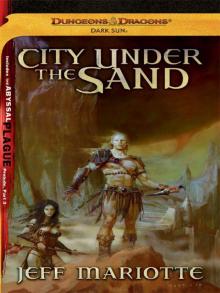 City Under the Sand
City Under the Sand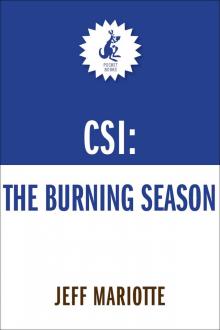 The Burning Season
The Burning Season Sanctuary
Sanctuary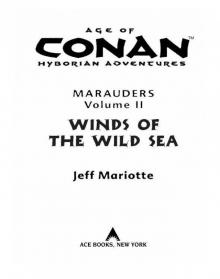 Winds of the Wild Sea
Winds of the Wild Sea Serpents in the Garden
Serpents in the Garden Close to the Ground
Close to the Ground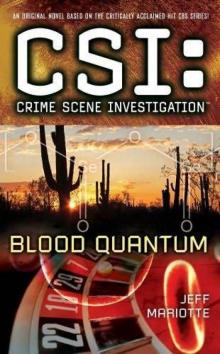 Blood Quantum
Blood Quantum Brass in Pocket
Brass in Pocket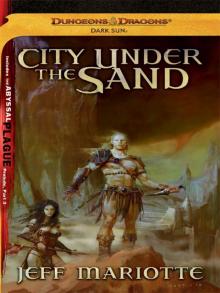 City Under the Sand: A Dark Sun Novel (Dungeons & Dragons: Dark Sun)
City Under the Sand: A Dark Sun Novel (Dungeons & Dragons: Dark Sun)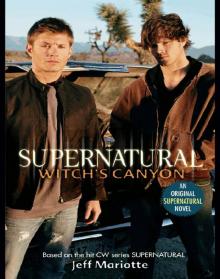 Witch's Canyon
Witch's Canyon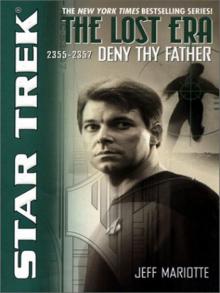 STAR TREK: The Lost Era - 2355-2357 - Deny Thy Father
STAR TREK: The Lost Era - 2355-2357 - Deny Thy Father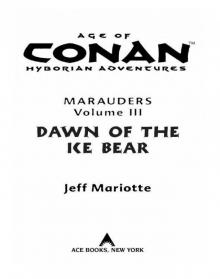 Dawn of the Ice Bear
Dawn of the Ice Bear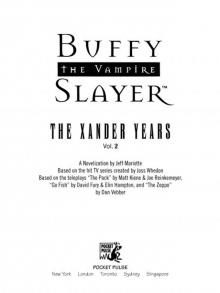 The Xander Years, Vol.2
The Xander Years, Vol.2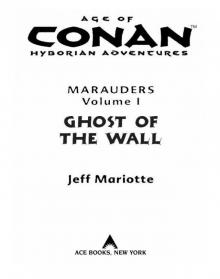 Ghost of the Wall
Ghost of the Wall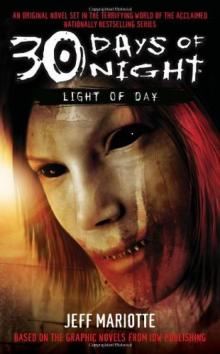 30 Days of Night: Light of Day
30 Days of Night: Light of Day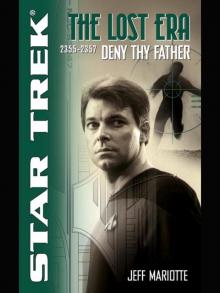 Deny Thy Father
Deny Thy Father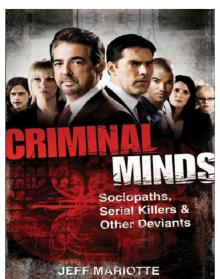 Criminal Minds
Criminal Minds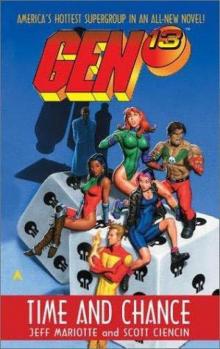 Time and Chance
Time and Chance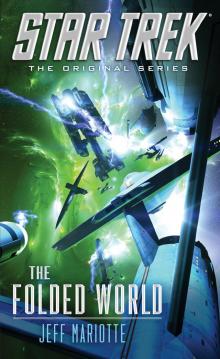 The Folded World
The Folded World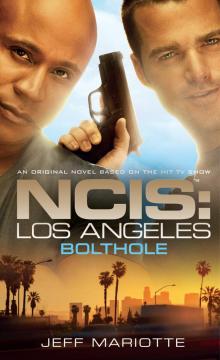 Bolthole
Bolthole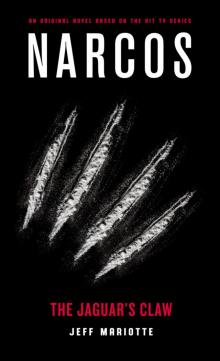 Narcos
Narcos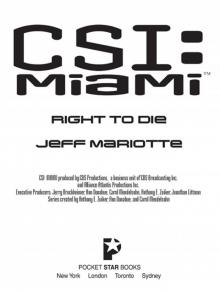 Right to Die
Right to Die